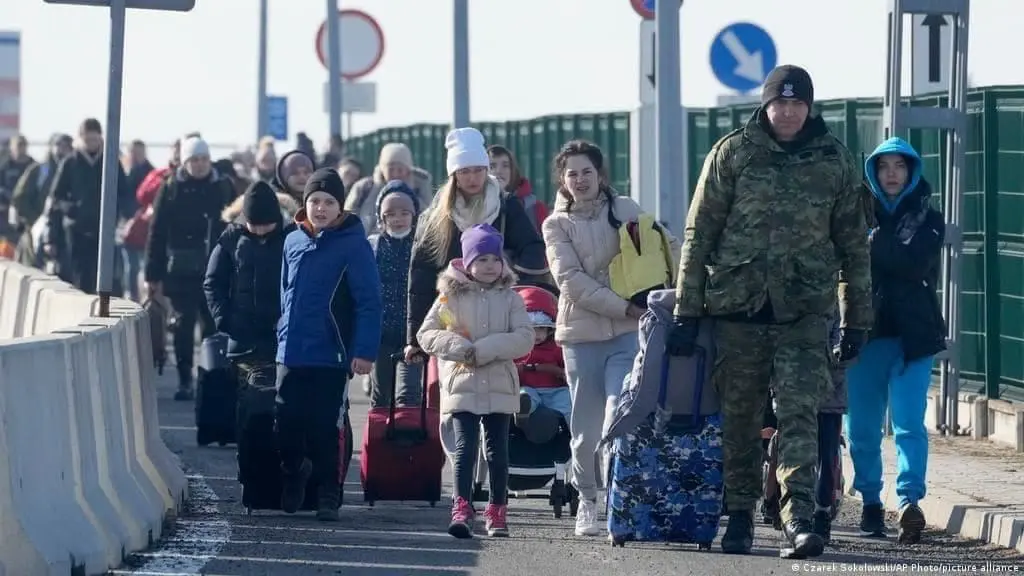We have been relatively quiet on the war and humanitarian disaster in Ukraine. It has been and remains a lot to process, especially for an organization with deep ties to that corner of the world. Our founders were Russian-speaking Jews from the former Ukrainian Soviet Socialist Republic, and – as you can probably imagine – those are some pretty complicated identity politics. But there’s nothing complicated about which side of this conflict they and the organization line up with. Our founders were first and foremost refugees, and we are all watching an entirely unnecessary and dire refugee crisis play out in the media and – in the case of our founders – in our extended families. War crimes against a civilian population are being committed in real time with 10 million Ukrainians displaced at the time of this post and up to 4 million of those having fled the country. We are emotionally gutted, but we stand in solidarity with Ukraine.
So what do we do now? The immediate answer, and one that has already been given by a number of organizations, is to donate to international humanitarian aid NGOs on the ground and with the capacity to rapidly push out large-scale assistance to the Ukrainian people. So that’s the immediate answer, and you should definitely go do that now if you haven’t already. Here’s a short list. The longer-term answer is a little more complicated, and the question should probably be reframed as “What does solidarity with Ukraine look like?”
First of all, solidarity without sacrifice is garbage. It’s the equivalent of sending “thoughts and prayers” via Facebook after a mass shooting. The non-military ways that we can support the people of Ukraine and prevent this from happening again require clear-eyed maturity and some personal inconvenience (which we Americans don’t have a great track record with in recent decades, but the alternatives are bleak).
Standing with Ukraine means:
• Reaching out to accept refugees and asylees from the conflict as New Americans
• Accepting inconvenience and holding the line against bad political actors
• Reducing global dependence on non-renewable energy
The US Must Continue to Accept Refugees and Asylum Seekers
There will be refugees. In the early days of the conflict, there was a hope that displaced persons in the Ukraine would be able to return to their homes at some point in the near future. That still may be the case for some, and with a new type of Ukrainian national identity being forged by this war, I think that a large number will return home to help rebuild. But as more and more of Ukraine is levelled by Russian munitions, there is less and less home to go back to. Right now, Eastern European countries are, improbably, doing the heavy lifting of temporarily caring for Ukrainian refugees, but it’s not a sustainable situation given the sheer numbers of people fleeing the conflict. We said it with Syria, Afghanistan, and now Ukraine: Bring them here. If they go through the standard refugee resettlement system, it could take a while; if there is federal action similar to what we saw with Afghanistan, it could be an expedited timeline. Either way, we need to continue building up resettlement infrastructure to welcome new arrivals and maintain the volunteer and provider networks that support their work.
There will also be asylum seekers. Some 30,000 Russians have already fled Putin’s increasingly openly fascist regime, many into Georgia and other countries where they don’t need a visa. These are professionals, academics, artists, opposition figures, and others that see no future for themselves in a country that seems determined to roll back the clock on individual freedoms by 50 years. Some are already showing up at the US border and requesting asylum, and – in the process – exposing the arbitrariness and unsound logic behind our federal immigration and asylum policies and enforcement. These individuals are currently not being admitted at the border even though they are fleeing a mass-murdering Bond villain and easily clear the bar of credible fear of persecution should they return to Russia. Ukrainians are being allowed in on a case-by-case basis, but asylum seekers from other countries are being turned away under Title 42, with beleaguered border authorities disingenuously citing public health concerns (as they have been with millions of migrants and asylum seekers for the last two years). We have to advocate for equitable and sustainable policy around immigration – including asylum – or none of this works.
The US Must Hold the Line against Divisive Political Calculations
For most of us, the initial shock of Russia’s invasion and the suffering in the Ukraine might wear off soon. So too might the initial impulse to unify as a country in support of the Ukrainian people. We need to hold the line.
There is a already a small but vocal fringe in American public discourse that believes we should let Putin have his way with Ukraine, that we should “mind our own business.” If we don’t defend democracies, even messy democracies (like our own and Ukraine’s – and messy democracies might need the most defending), then who are we even as a nation anymore? And it’s easy to offer rhetorical, operational, and financial support when it doesn’t really affect us in a tangible way. But this war and the ensuing and necessary sanctions are already sending a shock through global markets and supply chains that will intensify the inflationary environment we find ourselves in. Some of this was going to happen anyway, as a lot of deflationary tabs that we’ve run up over the last four decades are coming due, but the war is bringing it into sharp focus. Things are going to get more expensive, full stop. Across the board. And the default move for bad political actors domestically will be to weaponize blame for higher fuel prices, fertilizer prices, grain prices, and so on, against the sanctions and US leadership stance on Russian war crimes, which could make it very tempting to sell out our values for convenience and cheaper commodities. We, as a nation, need to head this off now and commit to the inconvenience of solidarity with Ukraine.
Ukraine will need some kind of Marshall Plan to rebuild. And they’re going to need it in an environment where money may well be tighter than it is now. We need to hold the line by committing to solid and sustainable support for Ukraine regardless of which party is in office or how the economy shifts.
We Must Reduce Dependence on Non-renewable Energy
And speaking of inconvenience… After decades of active wars in the Middle East to (among other goals, of course) secure access to oil, it doesn’t seem all that radical to humbly suggest that we need to accelerate the move away from sources of energy that perpetuate conflict and that are killing us as a species. Our dependence on non-renewable energy functionally ties our hands and those of our allies to live out our values. It ties our hands against the worst of human rights abuses, against genocides. (Yemen doesn’t get a lot of airtime in the States, but take a brief dive into that conflict if you want to see some really heinous stuff that we’re not doing anything about.) For all the talk about US and Western sanctions on Russia – and they are substantial – there is still targeted pressure that we could inflict on Putin’s war economy but don’t – and we don’t because the West cannot function without access to Russian energy. If we want to have any hope of ever being able to stop throwing peoples and nations under the bus in order to fuel the bus, we need to accelerate the move to energy independence – renewable energy independence – immediately. (And, in maybe another topic for another time, we should probably also address our national dependence on Chinese manufacturing and lack of self-sufficiency in our food supply.)
And, to come full circle, the effects of climate change – caused in large part by fossil fuel consumption (that’s right, feel free to clutch your pearls here, if necessary) – will continue to destabilize nations and generate refugees. As climate disasters impact crop viability, food supplies, and general living conditions, people will be on the move. A global shift toward renewable energy, in the broader sense and longer term, would go a long way to reducing many of the situations that create refugees. So, if you want a future with fewer refugees, advocate for renewable energy. It’s not an abstract, hippy-dippy concept – it’s national security and survival of the species. Those seem like fairly substantial things that we should be engaged on.
Update
And, as I’m writing this unexpectedly long post, there is breaking news that the US will accept around 100,000 initial refugees from the Ukraine. This is definitely a step in the right direction, but there will be more work to do. Stay involved and hold the line.
Jason Baker, PhD
Executive Director


